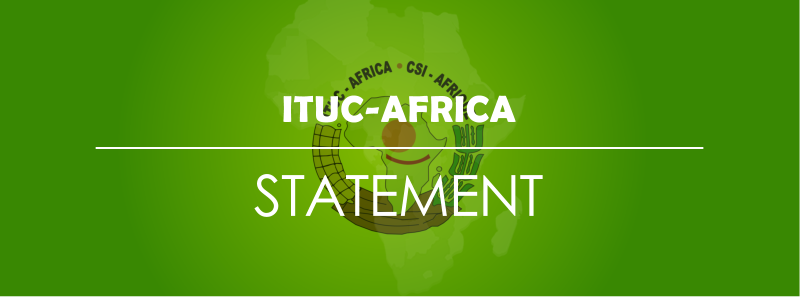
The African Regional Organisation of the International Trade Union Confederation (ITUC-Africa: https://www.ituc-africa.org/) urgently asks both official and private creditors, including the World Bank and IMF, to swiftly prioritise and execute the restructuring of Africa’s debt. Events in Zambia has compelled us to make this call and to request that the Zambian case be given good attention. Urgent public debt treatment is vital for protecting Zambian citizens’ fundamental human rights and well-being.
Like many African nations, Zambia grapples with a constricting web of debt that significantly limits its fiscal flexibility. Extensive research spanning various African countries, including Zambia, underscores the correlation between mounting debt and escalating inequality. It is established that the burden of unsustainable debt severely hampers the government’s capacity to allocate funds to essential sectors like infrastructure, health, and education while inhibiting the implementation of vital social protection measures. Consequently, revenues earmarked for crucial social services that should support lower-income groups are diverted towards servicing the debt, resulting in a detrimental impact on pivotal areas such as healthcare and education. This, in turn, leaves a void that directly affects the working class, who disproportionately bear the consequences of diminished access to quality healthcare and education.
Amidst formidable global economic challenges and the repercussions of dynamic shocks on African economies, ITUC-Africa emphasises the urgent need for a prompt restructuring of public debt in African economies, including Zambia. This strategic approach is vital to safeguard African citizens’, families, and communities’ human rights and overall well-being.
While Zambia and other African economies have demonstrated some forms of resilience to cope with and navigate a complex post-COVID recovery, contending with the challenges posed by tightening global financial conditions, geopolitical tensions, and ongoing climatic threats, concerns persist regarding the potential impact of debt distress on people’s socioeconomic rights. Despite growth challenges, there is optimism that Africa’s resilience will improve, underlined by the projected rebound in growth to 4.3% in 2024. However, persistent risks such as debt distress, inflation, and climate change underscore the necessity for proactive measures. These challenges have contributed to debt default in some African economies, including Zambia, with indications that others may follow suit.
ITUC-Africa Observations
ITUC-Africa has observed a troubling imbalance in Africa’s budget-to-debt servicing ratio that hinders opportunities for financing essential social services. The significant debt burden witnessed across the continent is partly attributed to irresponsible creditor behaviour driven by an insatiable pursuit of excessive profit. This was particularly evident during the COVID-19 pandemic, where reckless lending occurred with little tangible outcomes from the loans. Additionally, ITUC-Africa is gravely concernedby the conspicuous absence of transparency in the contracting, utilisation, and management of loans by borrowing governments.
The current state of African debt distress not only contributes to social and economic exclusion but also exacerbates poverty and inequality and fuels tension and discontent. The harsh servicing obligations attached to high levels of debt have palpable negative impacts on vital social protection enablers, such as infrastructure, education, health, agriculture, water and sanitation funding. The limited resources for these essential needs further accentuate the population’s suffering.
ITUC-Africa’s Recommendations and Calls for Action:
To Creditors (Official and Private):
ITUC-Africa emphasises the need to finalise the debt treatment promptly under the G20 Common Framework. As observed in Zambia, delays in restructuring have severe consequences on the economy, leading to high inflation and a high cost of living. ITUC-Africa calls for an improved G20 Common Framework, emphasising the need for consensus between official and private creditors to ensure fair and equitable debt treatment. The lack of consensus, as evident in Zambia’s situation, negatively impacts its citizens.
Additionally, ITUC-Africa urges the IMF to consider reforms that prioritise human-centric fiscal management. These reforms aim to mitigate the adverse effects of debt distress on workers and the general citizenry. ITUC-Africa calls for amicable debt servicing and repayment arrangements that do not compromise debtor countries’ abilities to address poverty and inequality, including exploring options for debt forgiveness.
To the Zambian Government:
ITUC-Africa acknowledges the significant efforts made by the Zambian government, including the enactment of the Public Debt Management Act and the recent agreement with the Official Creditor Committee (OCC). However, the organisation recommends the establishment of a dedicated Public Debt Management Office. This office would enhance oversight, transparency, and accountability, reinforcing the positive steps taken with enacting the Public Debt Management Act.
Conclusion:
ITUC-Africa emphasises the urgent need for collaborative efforts from all stakeholders to address the looming threat of debt distress in Africa, especially in the Zambian case. The call for debt restructuring aims to secure economic stability and protect the socioeconomic rights of Zambians and Africans. ITUC-Africa underscores the need for a paradigm shift in debt contracting, urging for transparency, improved debt management, accountability, and the active involvement of non-state actors. By adhering to these tenets, committing to responsible borrowing practices, and equitable, efficient and inclusive debt management, African countries can utilise debt to achieve sustainable, inclusive and shared development.
Akhator Joel ODIGIE
General Secretary
ITUC-Africa
Issued on behalf of the African Regional Organisation of the International Trade Union Confederation (ITUC-Africa) LOME – TOGO
Tuesday, January 23, 2024
